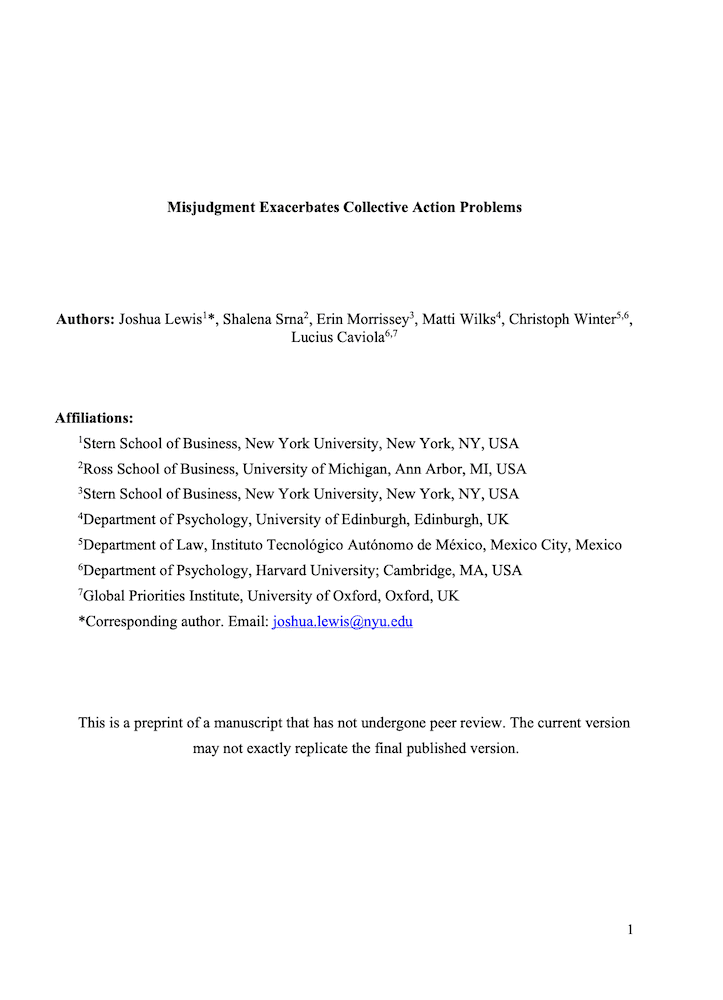Misjudgment Exacerbates Collective Action Problems
Joshua Lewis (New York University), Shalena Srna (University of Michigan), Erin Morrissey (New York University), Matti Wilks (University of Edinburgh), Christoph Winter (Instituto Tecnológico Autónomo de México and Harvard Univeristy) and Lucius Caviola (Global Priorities Institute, University of Oxford)
GPI Working Paper No. 2-2024
In collective action problems, suboptimal collective outcomes arise from each individual optimizing their own wellbeing. Past work assumes individuals do this because they care more about themselves than others. Yet, other factors could also contribute. We examine the role of empirical beliefs. Our results suggest people underestimate individual impact on collective problems. When collective action seems worthwhile, individual action often does not, even if the expected ratio of costs to benefits is the same. It is as if people believe “one person can’t make a difference.” We term this the collective action bias. It results from a fundamental feature of cognition: people find it hard to appreciate the impact of action that is on a much smaller scale than the problem it affects. We document this bias across nine experiments. It affects elected policymakers’ policy judgments. It affects lawyers’ and judges’ interpretation of a climate policy lawsuit. It occurs in both individualist and collectivist sample populations and in both adults and children. Finally, it influences real decisions about how others should use their money. These findings highlight the critical challenge of collective action problems. Without government intervention, not only will many individuals exacerbate collective problems due to self-interest, but even the most altruistic individuals may contribute due to misjudgment.
Other working papers
Against Willing Servitude: Autonomy in the Ethics of Advanced Artificial Intelligence – Adam Bales (Global Priorities Institute, University of Oxford)
Some people believe that advanced artificial intelligence systems (AIs) might, in the future, come to have moral status. Further, humans might be tempted to design such AIs that they serve us, carrying out tasks that make our lives better. This raises the question of whether designing AIs with moral status to be willing servants would problematically violate their autonomy. In this paper, I argue that it would in fact do so.
Longtermism, aggregation, and catastrophic risk – Emma J. Curran (University of Cambridge)
Advocates of longtermism point out that interventions which focus on improving the prospects of people in the very far future will, in expectation, bring about a significant amount of good. Indeed, in expectation, such long-term interventions bring about far more good than their short-term counterparts. As such, longtermists claim we have compelling moral reason to prefer long-term interventions. …
Existential Risk and Growth – Philip Trammell (Global Priorities Institute and Department of Economics, University of Oxford) and Leopold Aschenbrenner
Technologies may pose existential risks to civilization. Though accelerating technological development may increase the risk of anthropogenic existential catastrophe per period in the short run, two considerations suggest that a sector-neutral acceleration decreases the risk that such a catastrophe ever occurs. First, acceleration decreases the time spent at each technology level. Second, since a richer society is willing to sacrifice more for safety, optimal policy can yield an “existential risk Kuznets curve”; acceleration…

